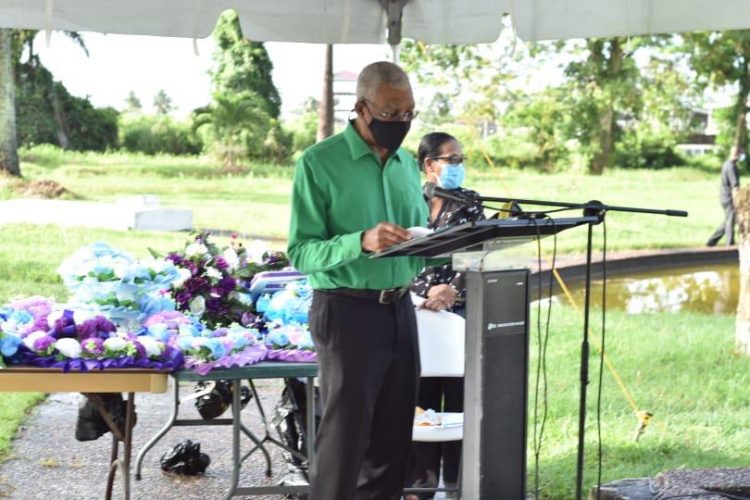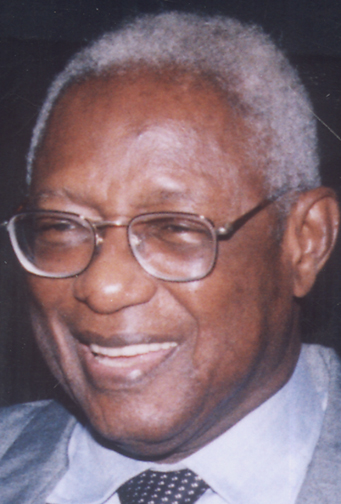Eighteen years after his death, former President Desmond Hoyte has been hailed as a “Champion of Change” by the current leader of his party, former President David Granger.
Hoyte who led Guyana from 1985 to 1992 is best remembered for the Economic Recovery Programme which had as its objectives the restoration of economic growth, incorporation of the parallel economy into the official economy, the elimination of external and internal payments imbalances, and the normalization of Guyana’s financial relations with its foreign creditors.
During his leadership of the party from 1985-2002 the People’s National Congress (PNC) also became the People’s National Congress Reform (PNCR).

According Granger, Hoyte who at the time of the ERP had already been in government for 17 years understood the necessity for change as did the party’s founder Forbes Burnham.
“[His] emphases on ideological and political change were not misplaced. He understood the inevitability of change, as the Founder-Leader did a generation earlier, not as an instrument of self-enrichment or self-aggrandizement but of the Party’s progress and the people’s happiness,” he noted.
Granger reminded that during his final address to the 13th Biennial Delegates Congress in 2002, four months before his death Hoyte used the word change 21 times.
“It was an unintended epilogue to his political career. It was both a warning of the danger of disunity and a yearning for an understanding of the necessity for change at the start of this millennium,” he contended.
During the Commemorative Ceremony held at the Seven Ponds in the Botanical Gardens, Granger sought to draw a parallel between the actions which saw Hoyte elevated to leader of the party and president and his own recent polarizing decision to sideline members of the executive.
PNCR Chairperson Volda Lawrence does not sit in the National Assembly because Granger as leader of the party list did not extract her name from the list of Candidates. This decision which has been seen as a clear attempt to elevate current Opposition Leader Joseph Harmon did not go over well with several sections of the party and public.
Granger yesterday argued that Burnham, the party’s Founder-Leader was always concerned about the changing conditions in the country and the Party’s response to contemporary challenges.
“The PNC’s transition from a party in opposition to one in government required a change in leadership and stewardship. It was out of this realisation that Forbes Burnham – discerning the quality of ‘intellectual integrity’ of the man who would be Leader and President – appointed Desmond Hoyte to a series of important portfolios,” Granger said.
He went on to note that Burnham saw the need for change after the first term in office ended with the 1968 general elections and changed the majority of ministers from the original cohort.
Hoyte however was appointed to the key portfolios of Minister of Home Affairs which he held from 1969-1970. He then became Minister of Finance between 1970 and 1972 and Minister of Works and Communications from 1972 to 1974. His appointments focused, thereafter, on the economy as Minister of Economic Development, 1974-1980 and Vice-President for Economic Planning and Finance after the 1980 general elections; he was re-designated Vice-President, Production in 1983.
Again recognizing the need for change, Granger said that Burnham appointed Hoyte as Prime Minister following Dr Ptolemy Reid’s resignation in 1984.
Reminding that Hoyte was elected Party Leader at the 6th Biennial Delegates’ Congress in August 1985 and re-elected repeatedly as Party Leader from 1992 t0 2002, Granger labeled that period a decade of discord – during which dissidents undermined the Leader’s authority and splintered the Party’s solidarity.
“Change is as necessary a part of politics as it is of life. Those who do not change become dinosaurs, irrelevant and, eventually, extinct. Change is as necessary a part of politics as it is of life. If we do not adapt to new circumstance, new challenges and new responsibilities we cannot survive, much less overcome,” Granger concluded.



